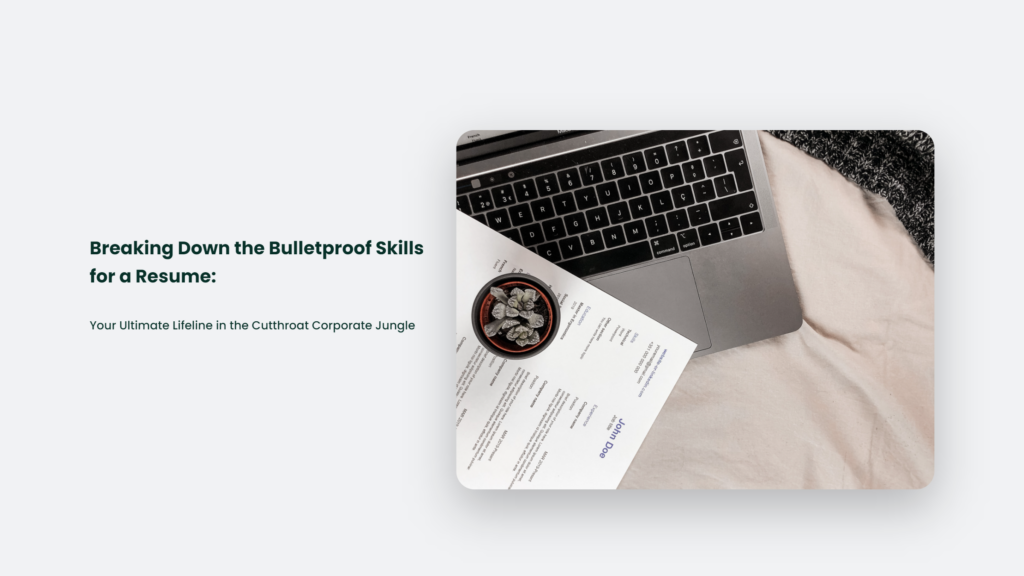

Breaking Down the Bulletproof Skills for a Resume: Your Ultimate Lifeline in the Cutthroat Corporate Jungle

As Seen On
Being ‘competent’ is the new ‘average’ in a world that spins at a billion miles an hour. A resume isn’t just a two-page list of your previous jobs and academic qualifications anymore. It’s your sassy sales pitch, a weapon to fight through the corporate jungle’s carnivorous competition.
So, what are the killer skills for a resume that will make you the lion of this safari? Let’s delve deep into it and prepare you for the wild ride.

Table of Contents
Skills for a Resume: The Hard Skills
Picture this: you’re standing in an expansive gallery, your gaze travelling from one Picasso replica to another. Some are so exact, so meticulously recreated that they could give the real deal a run for its money. However, others look as if Picasso created them during a nasty bout of the flu.
It’s a spectrum – from the truly remarkable to the disappointingly mundane. It is where your hard skills come into play, turning you into that flawless, awe-inspiring replica.
Hard skills are your non-negotiables, your bread and butter in the professional world. They are the ones you can learn in a classroom or a training program, the ones you can quantify, validate, and flaunt on your resume like a shiny medal. It’s your ‘can-do’ abilities – the concrete evidence that you can perform certain tasks and do them exceptionally well.
Now, let’s dive a bit deeper, shall we?
The Digital Maestro: Coding
Coding is as trendy as your grandma’s vintage purse in a world that’s pivoting more towards digitalisation. It’s the ‘now’ skill that’s highly sought after across various industries, transcending the boundaries of the traditional tech sphere.
Python, Java, C++, Ruby on Rails – it doesn’t matter what language you choose. Coding is the Esperanto of our digital age, and it’s high time you add this linguistic prowess to your professional repertoire.
The Gold Digger: Data Analysis
Today’s business landscape is an endless gold mine of data. Every click, search, and transaction leaves a digital footprint, a treasure trove of business insights. And just like gold needs to be mined, refined, and moulded into jewellery, data needs to be collected, analysed and transformed into actionable strategies.
Around 76% of organisations plan to increase their investment in data analysis within the next three years, according to a survey by NewVantage Partners. It makes a data analyst more popular than the prom queen in an American high school – the belle of the corporate ball, if you will.
The Polyglot Prodigy: Foreign Languages
Bilingual? Trilingual? Polyglot? You have a skill hotter than a summer in Sahara if you can speak multiple languages. Being a multilingual maestro makes you as attractive as Brad Pitt at a singles’ party. It’s a passport to a global career, a shiny badge signalling your adaptability and ability to learn and excel at complex things.
A report from the Economist reveals a fascinating tidbit – bilingual employees can earn up to 20% more per hour compared to their monolingual counterparts. And let’s be real, who wouldn’t want that extra moolah in their paycheck?
The Orchestrator: Project Management
Remember that quote from Sun Tzu’s ‘Art of War’ – “In the midst of chaos, there is also opportunity?” Project management is all about finding that opportunity in the chaos of deadlines, budgets, and stakeholder expectations. It’s about orchestrating a symphony in a racket, turning pandemonium into a meticulously planned and executed project.
Project management isn’t just a skill; it’s an art, a science, and a philosophy rolled into one. It’s about planning, executing, and controlling every aspect of a project, about leading a team towards a common goal. The ability to manage a project is like a hot jalapeno in the corporate salad – spicy, impactful, and something that gives the entire mix a zesty punch.
Soft Skills: The Sexy Siren of the Corporate World
Soft skills are like your quirky personality traits. They’re what makes you, YOU. They’re your unique brand, your corporate fingerprint. So, let’s see what sexy sirens we can unleash on you.
- Communication: If hard skills are your bricks, communication is the mortar holding everything together. You can say what you mean and mean what you say briefly, clearly, and, here’s the kicker, convincingly.
- Problem-Solving: Here’s a hypothetical for you. What do you do if your boss is Godzilla on a rampage and a project deadline is the city he’s about to stomp on? Problem-solving skills are your answer.
- Leadership: The ability to inspire many people to rally behind a common goal. You’re not just a wolf pack member; you’re leading it.
- Creativity: Jobs can be automated, but creativity? That’s a uniquely human trait. It’s your golden ticket to ride the career roller-coaster to the top.
Now, we’ve talked about hard and soft skills. But there’s one last piece to this puzzle.

The ‘X’ Factor: Transferable Skills
In the realm of employment, the skillset you bring to the table determines your market value. You might be an expert at juggling numbers, or perhaps, you’re the ‘Picasso’ of digital art. But the question is – are these skills locked within the confines of a particular job or industry, or can they smoothly transition across different fields? It is where the magic of transferable skills comes into play.
Picture your transferable skills as the secret sauce of your professional portfolio – the tangy twist that can turn a bland burger into a gourmet feast. They’re the skills that don’t play by the rules, the ones that can hop, skip, and jump across industries and roles like a globetrotting spy. They’re the skills that make you ‘you,’ adding a dash of colour to your black-and-white resume.
So, what are some of the transferable skills that should make it to your resume? Let’s find out!
Time is Money: Mastering Time Management
The adage “Time is Money” isn’t just a fancy saying; it’s the unspoken mantra of the corporate world. As a professional, your time management efficiency is akin to a wizard who can conjure up gold. It’s your ticket to becoming an invaluable asset to any organisation.
But what does being a time management ninja entail? It means you can multitask like a pro, juggle a thousand tasks without breaking a sweat, meet deadlines without the eleventh-hour panic, and even have time for that much-deserved lunch break! So, if you’ve mastered the art of bending time to your will, it’s a skill that needs to shine bright on your resume.
No Man is an Island: The Power of Collaboration
John Donne famously penned, “No man is an island,” this rings particularly true in today’s interconnected, globalised professional landscape. The ability to collaborate and weave diverse talents into a unified team is an art. It’s about playing well with others, combining strengths and overcoming weaknesses.
Collaboration is like a well-choreographed dance. It’s about coordinating moves, matching rhythms, and creating a mesmerising performance from individual steps. It’s about the magic that happens when different people come together, bringing their unique perspectives. If you can be that choreographer, that weaver of magic, make sure it’s known on your resume.
Survival of the Fittest: Embracing Adaptability
Charles Darwin said, “It’s not the strongest of the species that survives, nor the most intelligent; it is the most adaptable to change.” This evolutionary wisdom resonates loudly within the dynamic corporate sphere. With changing business landscapes, fluctuating markets, and evolving consumer behaviour, adaptability isn’t just a ‘nice-to-have’; it’s a necessity.
Being adaptable means navigating through change with grace, reshaping strategies with agility, and embracing new scenarios with an open mind. It’s about thriving in uncertainty, turning challenges into opportunities, and driving innovation amid disruption. If you are an adaptability ace, let it be the highlight of your resume.
By now, we’ve journeyed through hard skills, dipped our toes into soft skills, and ventured into the exciting territory of transferable skills. But how do you ensure these skills don’t just ‘exist’ on your resume but shine like a Fourth of July firework?
Let’s delve into the mechanics of it in the next section.
The ‘How’: Making Your Skills Pop
When it comes to hard skills, don’t just state them. Quantify them. Instead of saying, “I know how to code”, say, “I developed a new application using Python that boosted productivity by 30%”. Make your skills the headline, not the footnote.
For soft skills, use examples and action verbs. Instead of saying “good communicator”, say “facilitated effective team communication leading to a 15% reduction in project completion time”.
For transferable skills, use the job description as a map. Identify what transferable skills the job requires and then mirror those in your resume.
And lastly, don’t forget to place these skills prominently.
They should be up there in the summary or at least within the top third of your resume. You want the hiring manager to spot them faster than a kid who spots an ice cream truck on a hot summer day.
Frequently Asked Questions:
What are the most important skills for a resume?
It depends on the job and the industry. However, a blend of hard, soft, and transferable skills makes a compelling resume.
How should I list my skills on a resume?
List your hard skills with quantifiable achievements and your soft and transferable skills with specific examples and action verbs.
Should I customize my skills for every job?
Absolutely! Always tailor your resume to match the job description.
Final Words:
Let’s end this wild safari with one last thought. Remember, skills for a resume aren’t just about meeting job requirements. They’re about painting a vibrant, irresistible picture of YOU. They’re about showing that you’re not just another candidate but THE candidate. So, go ahead and make your skills as irresistible as a slice of warm apple pie on a cold winter night!
Konger
Up until working with Casey, we had only had poor to mediocre experiences outsourcing work to agencies. Casey & the team at CJ&CO are the exception to the rule.
Communication was beyond great, his understanding of our vision was phenomenal, and instead of needing babysitting like the other agencies we worked with, he was not only completely dependable but also gave us sound suggestions on how to get better results, at the risk of us not needing him for the initial job we requested (absolute gem).
This has truly been the first time we worked with someone outside of our business that quickly grasped our vision, and that I could completely forget about and would still deliver above expectations.
I honestly can't wait to work in many more projects together!
Disclaimer
*The information this blog provides is for general informational purposes only and is not intended as financial or professional advice. The information may not reflect current developments and may be changed or updated without notice. Any opinions expressed on this blog are the author’s own and do not necessarily reflect the views of the author’s employer or any other organization. You should not act or rely on any information contained in this blog without first seeking the advice of a professional. No representation or warranty, express or implied, is made as to the accuracy or completeness of the information contained in this blog. The author and affiliated parties assume no liability for any errors or omissions.

